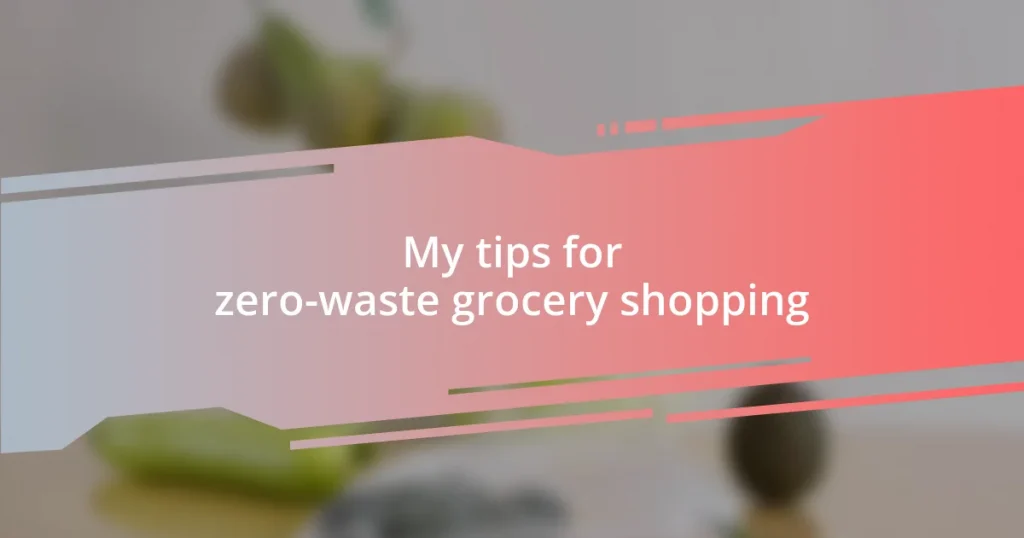Key takeaways:
- The zero-waste concept emphasizes reducing waste by rethinking consumption habits and using resources mindfully.
- Zero-waste shopping offers benefits such as significant waste reduction, cost savings through bulk purchasing, and support for local businesses.
- Maintaining a zero-waste lifestyle requires planning, community engagement, and awareness of consumption patterns while embracing imperfections.
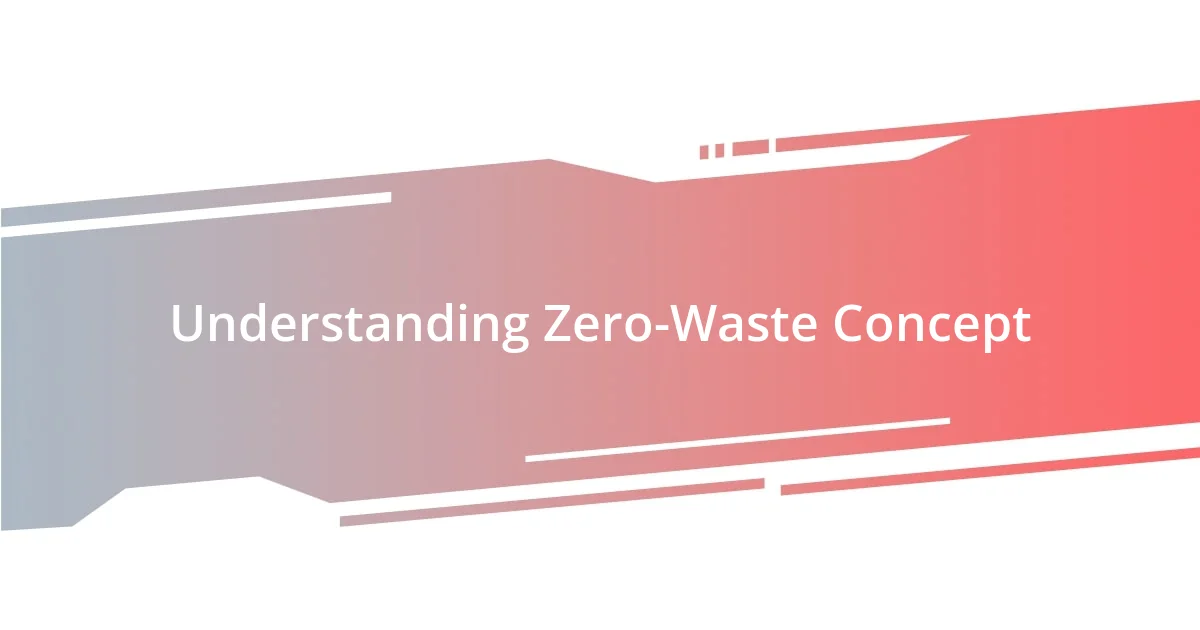
Understanding Zero-Waste Concept
The zero-waste concept revolves around reducing waste to the absolute minimum by rethinking our consumption habits. I remember the first time I switched my shopping habits; I was amazed at how simply refusing plastic bags felt like a small victory against our throwaway culture. It made me ponder: what if everyone embraced this mindset?
At its core, zero waste is about keeping resources in use for as long as possible and using them in a way that minimizes waste. I’ve learned to appreciate buying in bulk and using my own containers; it’s not just eco-friendly, it’s a bit of a treasure hunt! Have you ever felt that rush of finding the perfect, unpackaged cinnamon or grains? It’s a simple joy that reconnects us to the origins of our food.
Embracing zero waste also fosters a deeper connection to the environment and promotes mindfulness in our daily choices. I’ve found that evaluating my purchases goes beyond just the product itself; it’s about considering its life cycle. Isn’t it fascinating to think about the ripple effect our small choices can create in the bigger picture of sustainability?
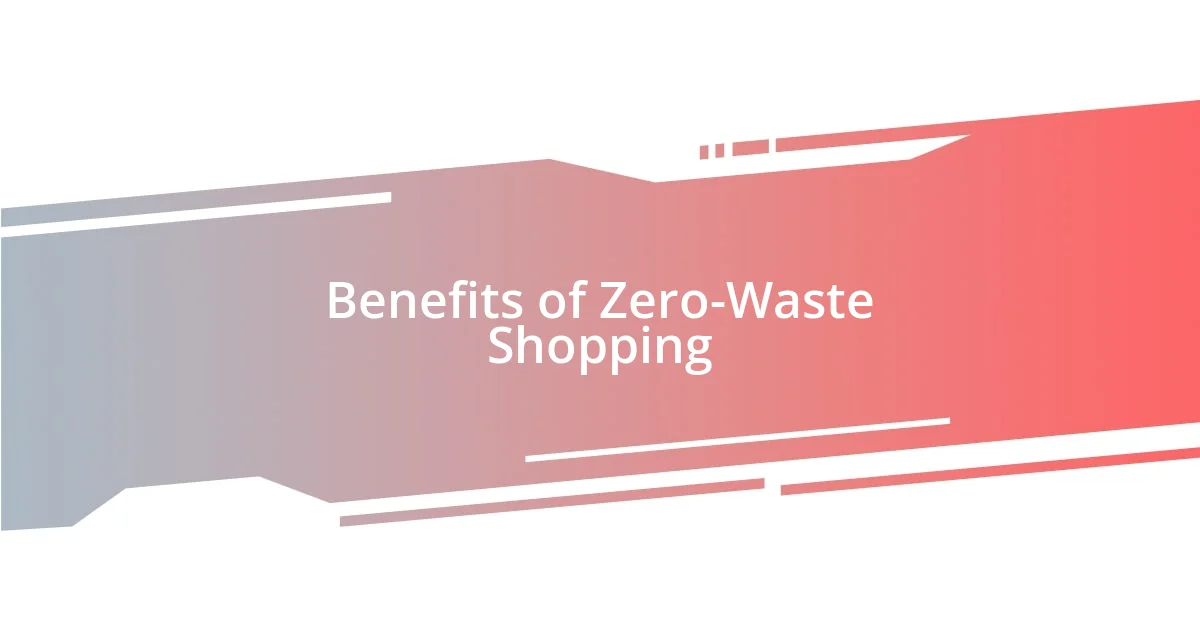
Benefits of Zero-Waste Shopping
In my experience, one of the most immediate benefits of zero-waste shopping is the significant reduction in household waste. When I started bringing my own bags and containers, I noticed how much less I was throwing away each week. It felt liberating to minimize my footprint while also inspiring friends and family to rethink their own shopping habits.
Another surprising perk has been the cost savings over time. Initially, I worried about the investment in reusable containers, but I quickly discovered that buying in bulk often means lower prices per unit. Plus, being conscious of what I buy has helped me avoid impulse purchases that usually end up as food waste. Have you ever tried calculating how much those small snacks and packaged items add up?
Moreover, zero-waste shopping encourages the support of local businesses, which I find incredibly rewarding. I love strolling through local markets, chatting with farmers, and choosing seasonal produce without packaging. It creates a sense of community and connection to the food chain that I never appreciated before. Isn’t it refreshing to know where your food comes from and to support those who grow it?
| Benefit | Description |
|---|---|
| Waste Reduction | Lowers household waste by refusing single-use plastics and packaging. |
| Cost Savings | Buying bulk and reusing containers leads to long-term savings. |
| Community Support | Encourages purchasing from local farmers and markets, fostering community ties. |
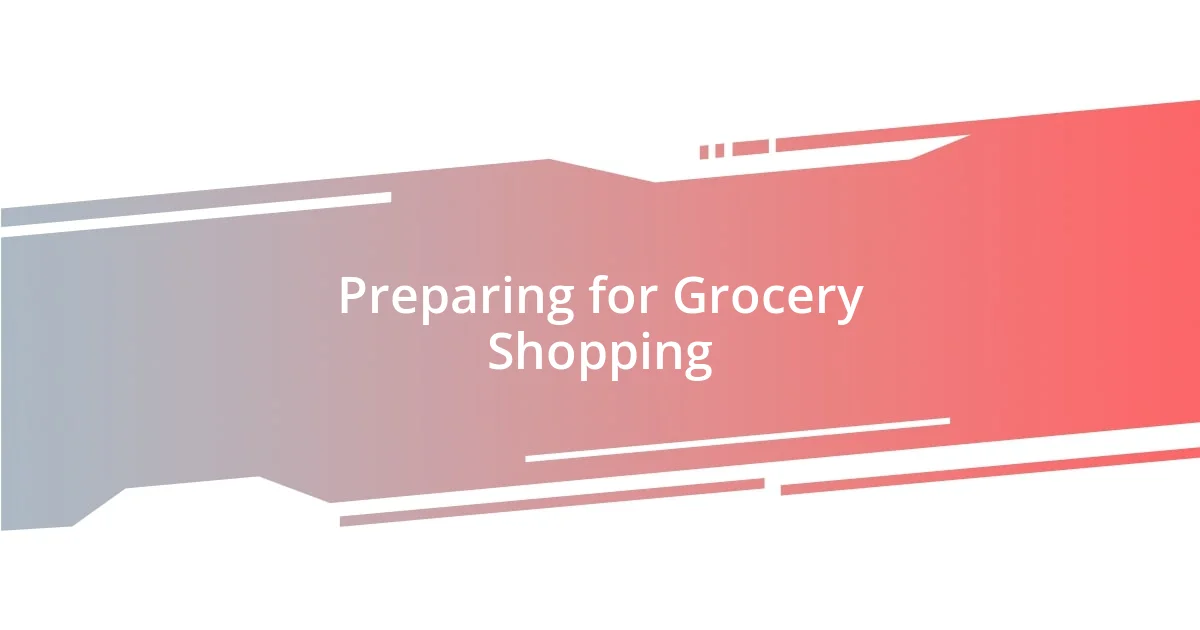
Preparing for Grocery Shopping
Before heading out to the grocery store, it’s crucial to set yourself up for success with a little planning. I always take a moment to assess what I already have in my pantry and fridge, and believe me, this saves me from unnecessary purchases, reducing both waste and cost. There’s something satisfying about knowing exactly what I need, which helps me stay focused and avoids any last-minute decisions that might lead to impulse buys.
Here’s a handy list to help you prepare for your zero-waste grocery shopping:
- Inventory Check: Take stock of what you already have.
- Meal Planning: Decide on meals for the week to guide your shopping list.
- Reusable Bags and Containers: Gather these to avoid single-use plastics.
- Shopping List: Write down only what you need to stick to your plan.
- Research Stores: Identify local markets or bulk food stores that align with your zero-waste goals.
I remember one shopping trip when I forgot my reusable bags and containers. It felt disheartening to see so many products with plastic wrapping. That experience motivated me to never let that happen again—I keep bags and jars in my car now! It’s these small moments that reinforce my commitment to this lifestyle.
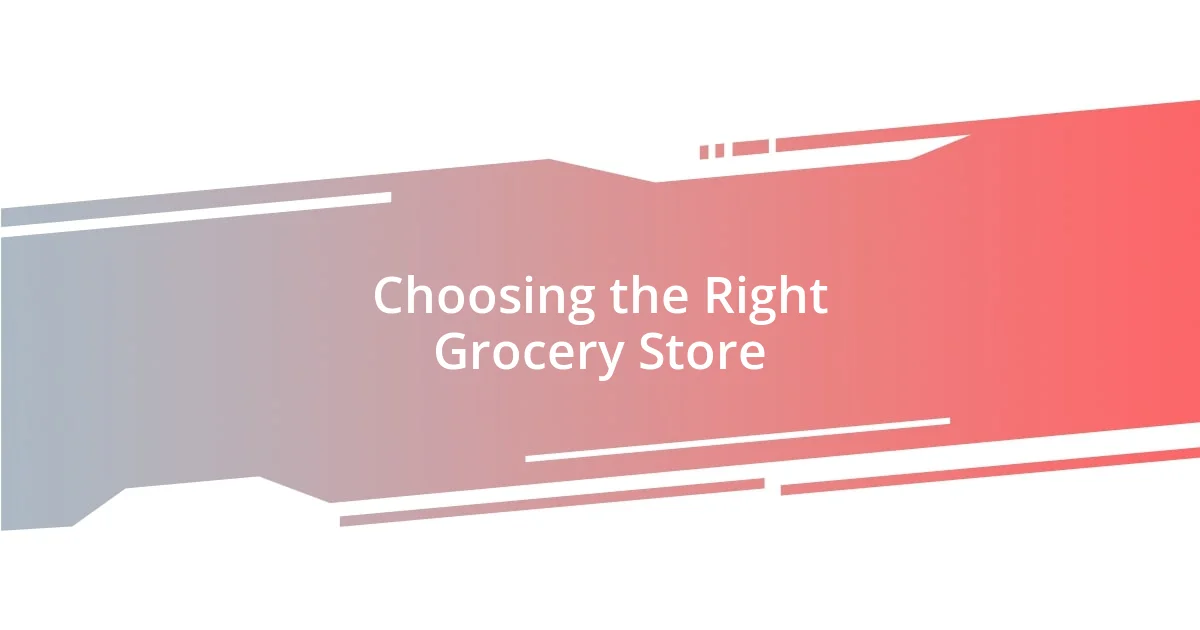
Choosing the Right Grocery Store
When choosing the right grocery store for zero-waste shopping, I recommend looking for places that prioritize sustainability. For instance, I’ve found that local co-ops often offer bulk sections where you can fill your own containers. Walking through those aisles, I can really appreciate the effort they put into reducing packaging waste—there’s a certain satisfaction in making my selections without the crinkling of plastic wrappers.
Another factor to consider is the store’s approach to local sourcing. I cherish visiting markets that stock produce from nearby farms; it feels like I’m directly supporting my community. It’s such a joy to speak with farmers about their growing practices and to see the pride they take in their products. Doesn’t it deepen your connection to the food you eat when you know its journey?
I remember a time when I stumbled upon a new shop focused entirely on zero-waste principles. It was a small space, but the atmosphere was brimming with enthusiasm. The owner was eager to share eco-friendly alternatives and even offered workshops on sustainable living. That experience opened my eyes to the vibrant community that surrounds zero-waste shopping—finding a place like that can truly enhance your journey toward a reduced waste lifestyle.
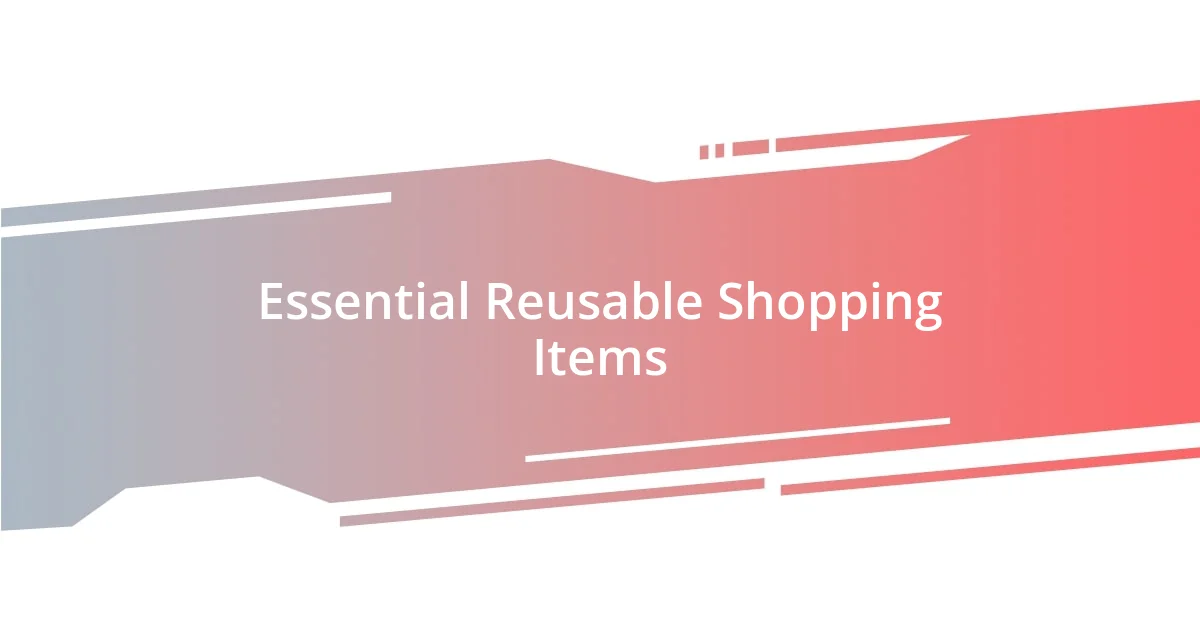
Essential Reusable Shopping Items
To make the most of your zero-waste grocery shopping, having the right reusable items is essential. I never leave home without my sturdy tote bags, which are perfect for carrying all my goodies while eliminating the need for plastic bags. They’re so durable and spacious that I often find myself fitting much more than I anticipated. Have you ever been surprised by how much you can actually carry in a single bag?
Another indispensable item for me is my glass storage jars, especially for purchasing bulk items like grains and nuts. The first time I filled up my jar with quinoa, I couldn’t help but smile, thinking about how that simple choice helps cut down on packaging waste. Being able to choose exactly how much I want, rather than a pre-packaged amount, is not only more sustainable but often saves money too. It’s like a little victory for both my wallet and the planet.
Lastly, I always bring along reusable produce bags. It might seem minor, but switching from those flimsy plastic bags to mesh or cotton alternatives really aligns with my commitment to reducing waste. I can vividly remember my excitement the first time I weighed my fruits and vegetables in those reusable bags and skipped the aisle of plastic! It just felt right; like I was continuing on my mission to live sustainably. What reusable items have you found make a difference in your shopping experience?
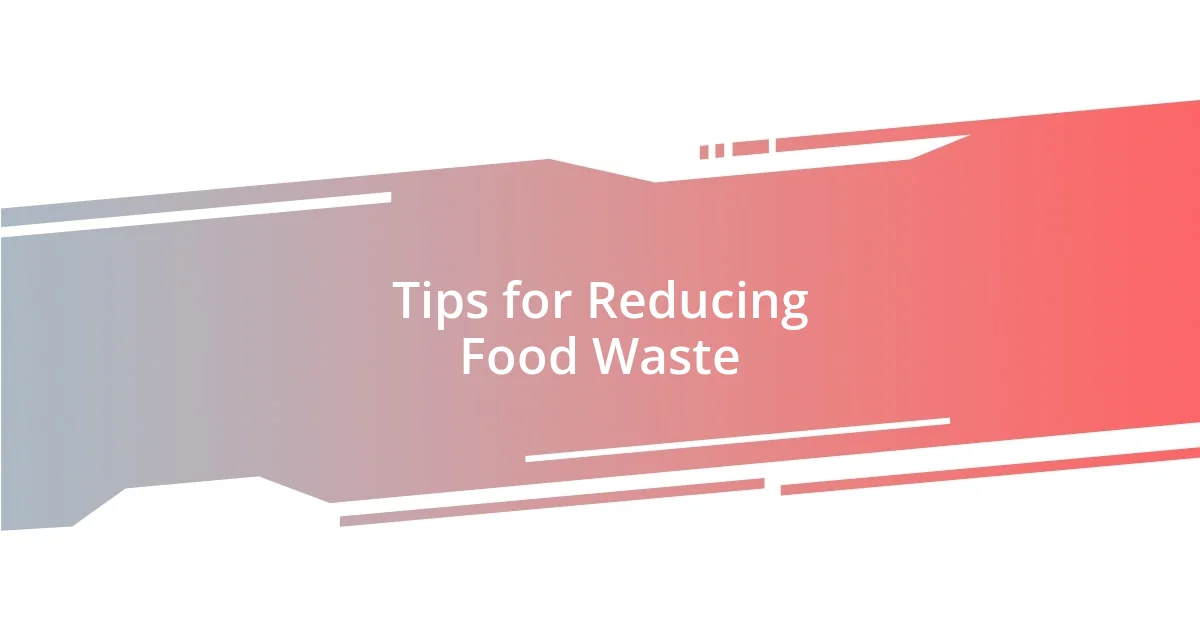
Tips for Reducing Food Waste
When it comes to reducing food waste, planning meals ahead of time can make a significant difference. I’ve often sat down on a Sunday evening to map out my meals for the week, and I can’t tell you how much more streamlined my grocery shopping becomes. This thoughtful approach not only keeps me from overbuying but also inspires creative ideas for using up leftovers. Have you ever planned a meal around what’s already in your fridge? It’s a bit like scavenger hunting, turning ingredients into delightful dishes!
Another tip that I’ve found invaluable is knowing how to store food properly. For instance, I used to toss my herbs in the fridge, but that often resulted in sad, wilted greens. Now, I’ve dedicated a little glass jar filled with water on my kitchen counter to keep them vibrant and fresh. Doesn’t it feel rewarding to look at a bunch of freshly trimmed cilantro instead of a shriveled mess? Simple changes like this can extend the life of your groceries, keeping them tasty and reducing waste.
Furthermore, I’ve discovered the joy of embracing odd vegetables and produce. When I first encountered wonky carrots and misshapen tomatoes at a local market, I was hesitant. But what struck me was the amazing flavor these “imperfect” vegetables offered. I remember whipping up a hearty stew with those funky carrots, and the result was nothing short of delicious. Isn’t it incredible how sometimes the most beautiful meals come from what others overlook? You might just find your next favorite recipe in something you would have previously passed by!
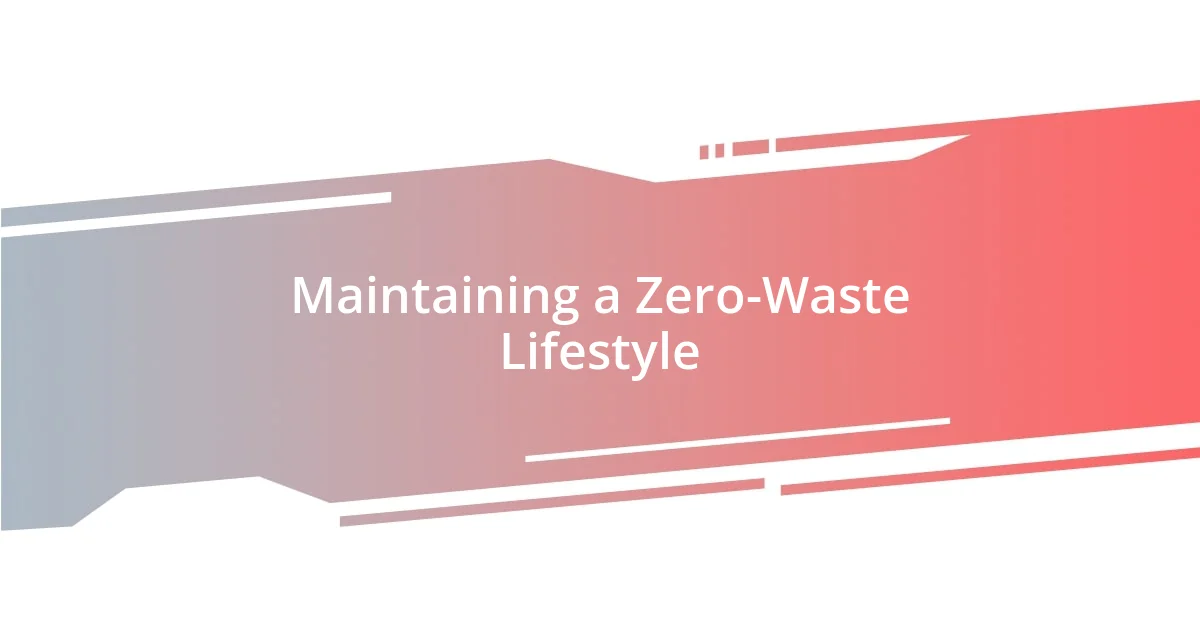
Maintaining a Zero-Waste Lifestyle
Maintaining a zero-waste lifestyle requires consistent effort and mindfulness in everyday choices. I find that surrounding myself with a community of like-minded individuals keeps me motivated. For instance, I often share experiences and tips during local zero-waste workshops, where we exchange ideas about sustainable living. It’s inspiring to see how others tackle challenges, and it makes the journey feel less daunting.
One habit that has truly transformed my approach is developing a keen awareness of my consumption patterns. I remember the first time I tracked my waste for a week—it was eye-opening! Identifying the most common items I tossed out helped me adjust my shopping habits. Have you ever taken a moment to assess what typically ends up in your trash? By understanding your waste, you can make small changes that lead to big impacts.
I’ve also learned to be forgiving of myself on this journey. There are days when I slip up and forget my reusable containers, and that’s okay. Rather than beat myself up over it, I take it as a learning opportunity to reinforce my commitment to sustainability. Embracing imperfection allows me to keep pushing forward, and I think that’s an essential part of maintaining a zero-waste lifestyle. How do you handle setbacks in your own eco-friendly journey?










